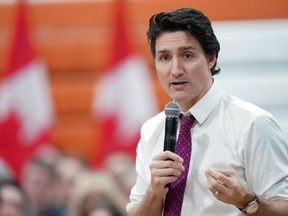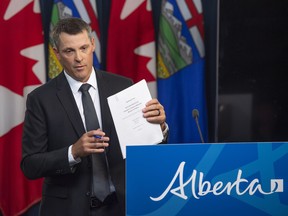There’s a risk Trudeau’s plan falls flat with voters
Article content
Though not always seen as his forte, Prime Minister Justin Trudeau does often take big swings on economic narrative, and he did exactly that at a keynote speech this week in Toronto.
Advertisement 2
Article content
Speaking to the U.S.-Canada Summit — a conference organized by Bank of Montreal and Eurasia Group — Trudeau took the opportunity to outline some of the core thinking and motivations behind his recently released budget, and defend what appears to be a pivot toward a more inward-looking and corporate-heavy set of policy choices, particularly around investment.
Article content
Article content
The speech gave reason for both hope and concern.
On the plus side, it underscored the extent to which the governing Liberals are now fully engaged with the big economic challenge of the day: Canada needs to compete for the increasingly expensive capital needed to finance one of the most ambitious climate transition efforts anywhere.
While Trudeau and his finance minister, Chrystia Freeland, have a tendency to oversell their decisions as responses to “historic moments,” the current situation does have an element of momentousness to it.
Article content
Advertisement 3
Article content
Not only will Canada struggle to drive down its greenhouse gas emissions to anywhere near its promised targets, but U.S. President Joe Biden’s plan to shower companies with subsidies to accelerate his country’s transition efforts will make our job more difficult.
“The budget we released last week was all about meeting this moment,” said Trudeau, who described the U.S. plan in a positive light as an incentive for the world to act.
The budget we released last week was all about meeting this moment
Justin Trudeau
Yet some of the other touch points in the speech also reveal just how challenging things will be for Trudeau going forward.
The prime minister took pains, for example, to pitch the costly measures as benefiting all Canadians.
Politically, the Liberals know they will need to convince average Canadians that all this money being allocated to businesses (much of it to foreign corporations) is consistent with their underlying governing philosophy to “choose people every time,” as Trudeau said in concluding his speech.
Advertisement 4
Article content
The main opposition Conservatives, who are adopting an increasingly anti-corporatist course, will pounce. There’s a risk Trudeau’s plan falls flat with voters, particularly if budget constraints harden as is widely expected.
The government estimates that investment tax credits it’s introducing for clean energy and technology investment will cost $80 billion over 11 years or so, the bulk of which will be backdated in the final half of that horizon when another prime minister is likely to be in power.
There are also questions about whether the measures are sufficient to do the job. Trudeau spent much time championing not just the new tax credits but the government’s project-by-project direct involvement in recent investments by large multinational firms such as Volkswagen AG and Nokia Corp.
Advertisement 5
Article content
Yet, if the cabinet needs to get involved in every major decision, that may be a sign of weakness, not strength.
This government has a confidence problem with business, who are wary of its commitment to getting big projects done when push comes to shove. That needs to be repaired, somehow, should the new investment plan work on a large scale.
Investment
Then again, at least the government is beginning to think seriously about private investment, an area where it’s struggled to find success these past seven years.
Trudeau characterized his climate measures as an attempt to “crowd in” capital — an apt way of thinking about the problem given how much direct investment our businesses do abroad.
As the world moves away from cheap money, policymakers could become covetous of these monies. That will be especially true as many businesses feel the pull of subsidies south of the border.
Advertisement 6
Article content
The flow of direct investment capital to the U.S. is not a hypothetical — it’s a feature of Canada’s economy.
Canadian business had been investing more in the U.S. than the other way around since before Trudeau came to power. It’s not a bad thing – being a creditor to the world with globally expanding businesses is a sign of wealth.
But the trend has accelerated, and Biden’s climate transition plan threatens to turn that stream of money going to the U.S. into a flood.
Net direct investment flows between the two countries has favoured the United States to the tune of $320 billion since 2007. About 80 per cent of that “deficit” has come since 2015.
The bulk of these net flows have been driven by Canada’s banks and other financial institutions, which have been keen to grow south of the border. (In manufacturing, for example, Canada continues to draw in U.S. capital.)
Advertisement 7
Article content
-

Budget 2023: Freeland shows Ottawa is no longer starving the beast
-

Why Rogers’ takeover of Shaw could one day lead to greater competition
-

Joe Biden’s visit may mark decline of Canada’s relationship with U.S.
In his speech, Trudeau described the financial sector — which has been hit by new taxes in the past couple of budgets — in terms that may suggest the industry is seen as secondary to the task at hand.
“Real wealth isn’t made on the trading floor. It’s created in factories, in fields, in labs, and in minds,” Trudeau said.
Given how much Canadian financial institutions are invested in the United States, it would probably be wise to consider them as critical players in any bid to bring (and keep) capital at home.
Theo Argitis is managing director at Compass Rose Group.
Trudeau’s big swing on economic narrative sparks both hope and concern
2023-04-09 14:00:06







Comments
Postmedia is committed to maintaining a lively but civil forum for discussion and encourage all readers to share their views on our articles. Comments may take up to an hour for moderation before appearing on the site. We ask you to keep your comments relevant and respectful. We have enabled email notifications—you will now receive an email if you receive a reply to your comment, there is an update to a comment thread you follow or if a user you follow comments. Visit our Community Guidelines for more information and details on how to adjust your email settings.
Join the Conversation